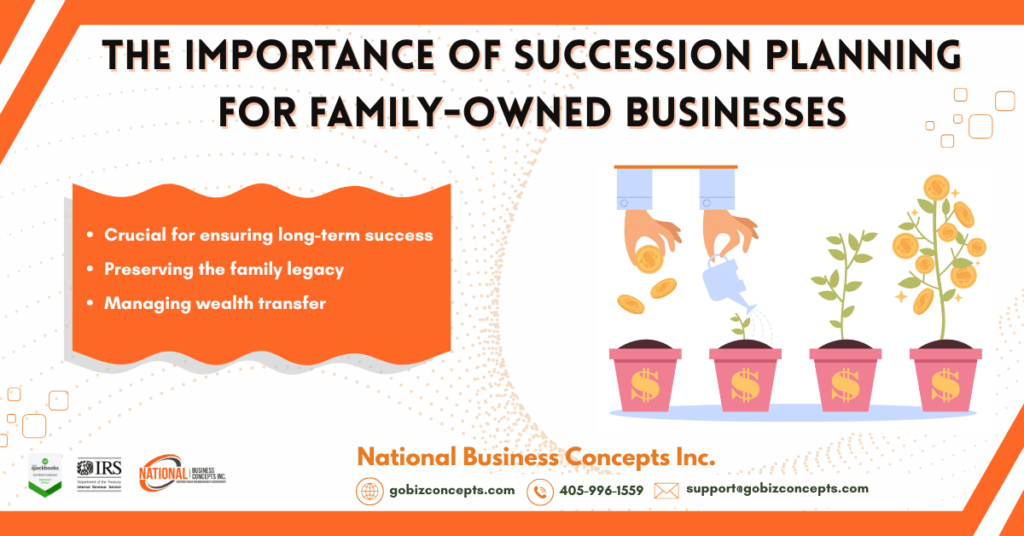Succession planning is crucial for family-owned businesses—it ensures the longevity, stability, and seamless transition of leadership from one generation to the next. At a granular level, it preserves a legacy, avoids leadership gaps, mitigates family conflicts, ensures business continuity, develops future leaders, and strengthens financial health.
Small Business Legacy
First, to preserve a business legacy, a family business is often built on deep-rooted values, traditions, and a commitment to customer service that sets it apart from competitors. Succession planning must ensure that this legacy is carried forward while allowing for necessary innovation and adaptation. Documenting the company’s history, core values, and unique business practices helps successors understand and appreciate the foundation upon which the business was built. Maintaining close relationships with loyal customers, preserving brand identity, and reinforcing the family’s mission ensures continuity. A structured mentorship program can help instil the family’s philosophy in the next generation, ensuring they uphold the business’s reputation and integrity while steering it toward modern success.Leadership Gap
A leadership gap can be disastrous for any business, resulting in confusion, operational inefficiencies, and loss of stakeholder confidence. So, a small family business must proactively plan for leadership transitions to prevent sudden vacancies. Identifying potential successors early and providing them with training in key business operations ensures they are ready when the time comes. Leadership gaps can also arise due to unexpected events like illness or financial difficulties, making contingency planning essential. Establishing clear job descriptions, delegating responsibilities to senior employees, and gradually exposing successors to leadership roles will ease the transition. Having a well-documented decision-making framework can prevent operational paralysis and ensure the business continues to function smoothly even during periods of change.Business Continuity
Business continuity is critical to maintaining profitability and stability during a transition. Without a solid plan in place, the absence of key leaders or sudden ownership changes can result in disruptions that negatively affect employees, customers, and financial standing. The successor should be involved in decision-making before taking control, ensuring they understand daily operations, supplier relationships, and customer expectations. Succession plans should also include external advisors such as accountants and legal professionals to help navigate financial or legal hurdles. Businesses should also explore diversification strategies to reduce dependency on a single revenue stream, ensuring resilience even if market conditions change during the transition period. Transparency with employees and stakeholders helps build trust and minimizes uncertainty, reinforcing stability throughout the succession process.Potential For Family Conflicts
The plan must seek to mitigate the potential for family conflicts. Disputes over succession decisions can threaten both the business and family relationships. A structured approach to conflict resolution can prevent emotional and financial disputes from escalating. Open communication is key—family members should discuss expectations and concerns early to avoid misunderstandings. Clearly defined roles and responsibilities ensure that each family member understands their place in the business and what is expected of them. Establishing formal agreements on ownership distribution, financial compensation, and decision-making authority eliminates ambiguity. Some families choose an external advisor or mediator to help navigate sensitive conversations, ensuring impartial solutions are found. Ultimately, prioritizing business longevity over personal grievances allows the family to work together toward a common goal while maintaining harmony.Leadership Development
Leadership development is more than just handing over authority—it involves preparing successors with the skills, experience, and confidence needed to lead effectively. Training programs, mentorship, and gradual exposure to key business operations allow successors to gain real-world experience. Encouraging leadership participation in decision-making, negotiations, and business strategy discussions enhances their ability to handle complex challenges. While hands-on experience is essential, formal education such as business management courses can complement practical knowledge. By fostering innovation and adaptability, future leaders can maintain the company’s vision while modernizing its operations to remain competitive. Empowering successors to develop their leadership style strengthens their ability to guide the business effectively in a changing market.Financial Planning
Sound financial planning is crucial in succession to prevent instability during transitions. A clear strategy for handling taxes, investments, and ownership transfers minimizes financial risks. Small businesses must assess their cash flow, debt obligations, and long-term viability before a transition occurs. Structured buy-sell agreements can clarify ownership stakes while preventing disputes. Planning for inheritance taxes and potential financial liabilities ensures successors do not face unexpected burdens. Diversifying revenue streams and strengthening profit margins before a transition ensures financial resilience. An external financial advisor can provide insights into the best strategies to secure financial stability for future generations, ensuring the business remains profitable and sustainable.Conclusions
Succession planning is essential for family-owned businesses, ensuring long-term success by preserving the company’s legacy while allowing innovation. A structured plan prevents leadership gaps, avoiding operational inefficiencies and stakeholder uncertainty. Business continuity depends on proactive preparation and minimizing disruptions during transitions. Clear strategies reduce family conflicts by defining roles and responsibilities. Developing future leaders through mentorship and training equips them with the confidence and skills to manage effectively. Financial stability is crucial, requiring tax planning and ownership transfer strategies. With foresight and strategy, families can secure growth while honouring past generations.
By Richard Thomas
Next: Part II


